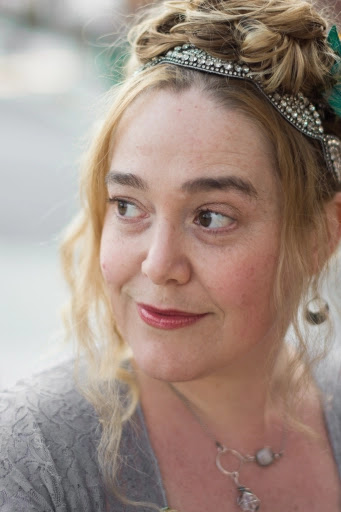C. S. E. Cooney
C.S.E. Cooney lives and writes in Queens. She is author of the World Fantasy Award-winning Bone Swans: Stories (2015), an audiobook narrator, and the singer/songwriter Brimstone Rhine.

Her new novel is Saint Death’s Daughter.
My Q&A with the author:
How much work does your title do to take readers into the story?Visit C.S.E. Cooney's website.
Like Lois McMaster Bujold’s Warrior’s Apprentice, Theodora Goss’s The Strange Case of the Alchemist’s Daughter, or Laurie R. King’s The Beekeeper’s Apprentice, Saint Death’s Daughter hints at the identity (and destiny) of the protagonist via a kind of shorthand nepotism. We learn something about Lanie Stones's character immediately because we already know something of the greater power behind her; what power, after all, is greater than Death itself?
From the title Saint Death’s Daughter, we may intimate that Lanie Stones is closely related to Death, perhaps even a beloved child, and that Death (in this world, at least) is considered holy. We might also conjecture that, being of this lineage, there are duties into which Lanie has been born—and might not have chosen, given the choice. We also know that, like any child of a famous parent, Lanie has a lot to live up to. (As the author, I can tell you that the title also leaves room for the projected sequels—Saint Death’s Herald and Saint Death’s Doorway—to suggest Lanie's character arc, as she grows in power, agency, and expectation.)
What's in a name?
Lanie Stones’s full name is “Miscellaneous Immiscible Stones.” One of my great delights in writing Saint Death’s Daughter was naming the whole branching family tree of Stoneses, from Unnatural Stones, to Irradiant Stones, to Ostrobogulous Stones, to Extramundane Stones, to Quick Fantastic Stones and her son, Even Quicker.
Part of my delight is in the ridiculous nature of their names, and how well the Stoneses wear them, or retrofit them (Unnatural’s nickname was “Natty,” as he was a very fine dresser) to suit their tastes. I wanted Lanie to have a name that meant jumbled, that meant not-one-thing-only, or not easily defined. She’s a necromancer, yes, but woman cannot live on necromancy alone. It’s her ability to adapt, to become something of a renaissance woman of the world, that really ensures her survival—for all her uncanny powers.
How surprised would your teenage reader self be by your novel?
I think my teenage self would have liked it fine. It may even have influenced her going forward. But she was more interested in fairy tales than necromancy at that point. I think it would help that she also liked Stephen King, Anne Rice, Clive Barker, and Angela Carter at that age. But she hadn’t yet discovered Terry Pratchett, which I think was her loss. Much of what I learned about humor in writing I learned later from Terry Pratchett, so I don’t think my teenaged self’s sense of humor was quite developed enough to appreciate my writing now. I think she might have skipped the footnotes, which would have been a real pity.
Do you find it harder to write beginnings or endings? Which do you change more?
I think my beginnings tend to be far more polished than my endings, simply because I always comb through what I’ve already written to get be primed for the next chapter I have to write. The end may get a good eight drafts, but by the time it’s written, the beginning would have had about twenty-four. But by the end I also knowmore about the voice, the characters, and the world than I did at the beginning, so it evens out. No, it’s the middle that’s the hardest: that fine balance between editing down until nothing but the essentials remain and keeping the bits of the book that made it, you know, actually worth writing. Which are not always the purely load-bearing, velocity-dependent, twistily cunning plotty McPlotty bits.
Do you see much of yourself in your characters? Do they have any connection to your personality, or are they a world apart?
All the characters are some aspect of opinion of me. Who do I fear, what repulses me, what lessons do I need to learn, where am I most wise or most foolish, what do I think is cool, what do I think we need more of in the world, what do I notice out in the real world that I want to reflect or enhance in my own fiction? Lanie in particular has to unlearn a lifetime of lessons taught to her in a toxic household. She has to acknowledge and examine the historical myths her own culture tells itself, and her place in it. She has to leave her home in order to understand it, and meet people whose perspectives are alien to her to realize just how strange and isolated a life she’d been leading. I believe in friendship, found family, tenderness, owning up to my mistakes, trying to do better—and Lanie does too. Eventually.
--Marshal Zeringue
